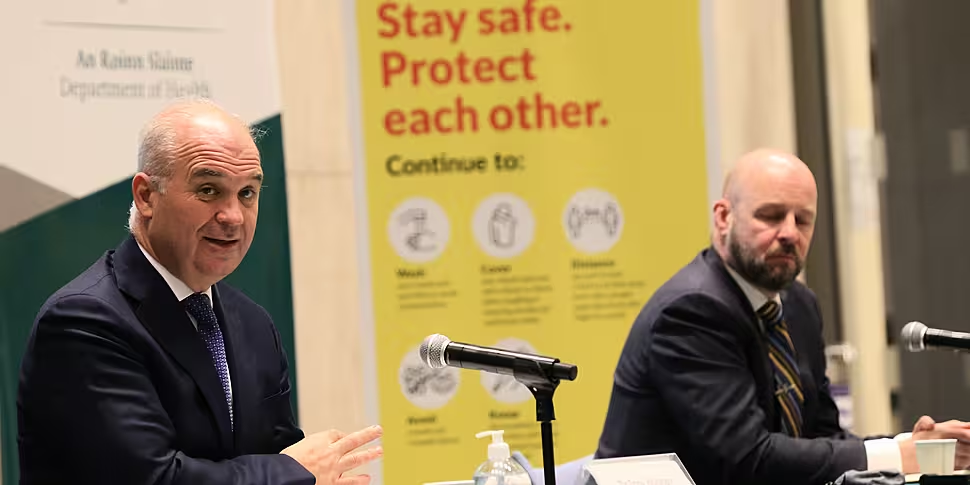There have been 1,620 new confirmed cases of COVID-19 in Ireland and 12 additional related deaths.
This gives a total of 2,237 COVID-19 related deaths and 91,779 confirmed cases in Ireland.
This includes the denotification of one death, and the re-classification of two probable cases to 'confirmed'.
Of the cases notified on Thursday:
- 794 are men / 819 are women
- 65% are under 45 years of age
- The median age is 34 years old
Some 498 cases are in Dublin, 203 in Limerick, 89 in Galway, 73 in Cork and 67 in Mayo.
The remaining 690 cases are spread across all other counties.
As of 2.00pm on Thursday, 490 COVID-19 patients are hospitalised - of which 42 are in ICU.
There have been 58 additional hospitalisations in the past 24 hours.
Dr Tony Holohan, Chief Medical Officer, said: "We are once again in the mitigation stage of this pandemic.
"The alarming escalation in the incidence of the virus in the general population gives great cause for concern.
"This disease is now widespread in our communities and as a result we are asking everyone to behave as if they are a close contact."
'No longer in containment phase'
He also explained changes to the testing system currently being used.
"To support the testing system through this surge, we are no longer advising close contacts of confirmed cases to get tested.
"Testing and tracing is an exercise in containment and we are no longer in a containment phase.
"However, it is imperative that if you are a close contact of a confirmed case you restrict your movements and contact your GP immediately if you develop symptoms."
He added: "The average number of contacts per case has risen from 2.5 in November to an average in recent days of 6.3.
"This is very far from where we need to be and I am appealing to everyone at every age to adhere to the mandated restrictions that the Government has introduced: stay at home, except for essential reasons, other than for exercise up to 5km."
Earlier, Dr Holohan said he 'couldn't rule out' coronavirus restrictions lasting until March.
It comes as Ireland has again moved into a full level five lockdown, in a bid to tackle the latest spike in cases.
He told Late Breakfast With Mark Cagney suggestions that the restrictions could last into March are a possibility.
"I can't rule that out, I couldn't rule that out - but at the moment, we have a four week opportunity."
"I know this wouldn't be possible - but if every single person could isolate themselves from every other person in the population for a period of 14 days, the whole infection would disappear".
"At the moment I'm not able to tell you that I see any sign that suggests that this is slowing down, unfortunately.
"With that very high level of infection it's going to take quite an amount of time - if I can say - to wash that level of infection out of the population.
"So we have it all to do in the four weeks until the end of January".
'Testing and tracing not sustainable'
Chief Clinical Officer at the HSE, Dr Colm Henry, said: "The pressure on our public health system, including testing and tracing services is not sustainable.
"A collective response by every individual, across every county, to follow the public health advice is essential to address the recent acceleration in case numbers that we are now seeing.
"The reintroduction of level five restrictions is essential to protect our vital public services such as hospital admissions and non-COVID care and to have the maximum impact in shortest possible timeframe to minimise the spread of this disease."
'Rapidly spreading in all age groups'
While Dr Ronan Glynn, Deputy Chief Medical Officer, said: "While we are currently in a very serious situation, we are not powerless against COVID-19.
"The best tool we have right now is each other. We have shown on multiple occasions that we can act collectively to break chains of transmission, reduce the intensity of this epidemic and slow down the increase in cases."
Dr Glynn added: "As we look to the New Year, we remember the 2,237 people who have sadly died with COVID-19 in Ireland in 2020, along with all of their families and loved ones who are grieving their loss.
"Let's do all we can to ensure that as few families as possible are similarly impacted in 2021."
And Professor Philip Nolan, chair of the NPHET Irish Epidemiological Modelling Advisory Group, said: "The epidemiological situation is very serious and the virus is spreading rapidly amongst all age groups, increasing the risk to those most vulnerable to severe infection, such as the medically vulnerable and people over 60 years of age.
"The reproduction number is at least 1.6 to 1.8. The daily growth rate is estimated now at 7% to 10% giving a doubling time of seven to 10 days or less.
"We project significant further increase in cases and hospitalisations in the coming days before public health measures take effect and are likely to see over 700-1000 people in hospital with COVID-19 early in the New Year.
"While it is difficult to face into further restrictions, it is vital that everyone plays their part by following the public health advice to protect those most vulnerable in the population."









